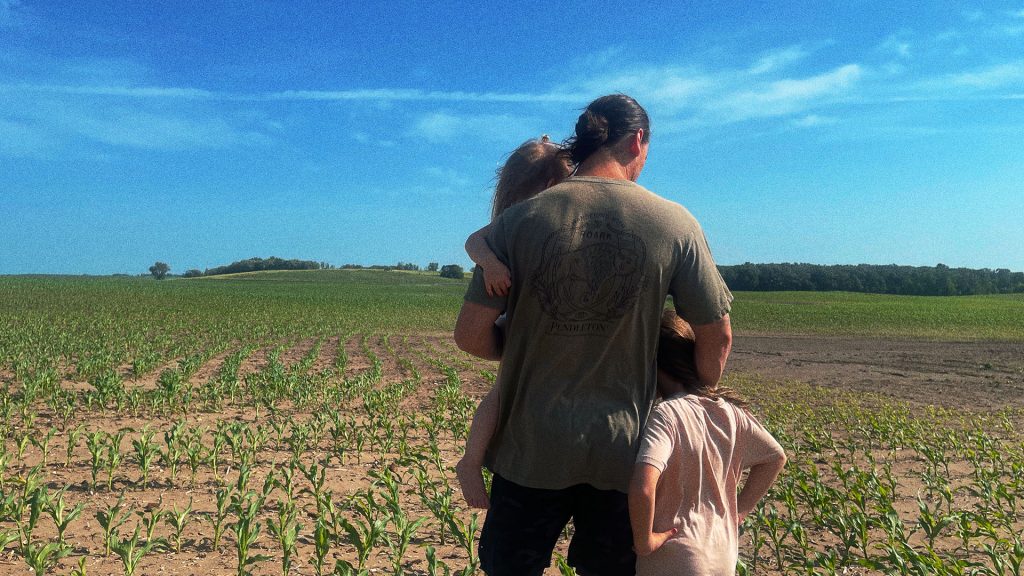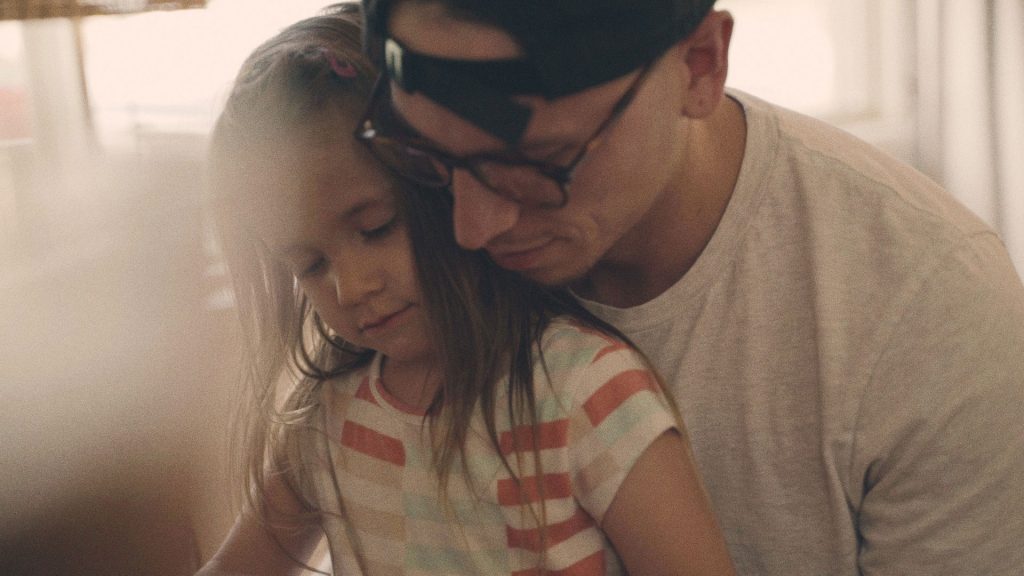Jordan Brien reminds us that Indigenous fatherhood is more than decolonial— it’s ceremonial. As a loving husband, talented musician, a creative, and above all, an incredible father to two beautiful daughters, Jordan approaches parenting with empathy and understanding. His story of fatherhood ignites hope for a generation of parents who are actively working to break colonial cycles of trauma that have impacted Indigenous families for too long.
Before entering his role as Creative Director for NDN Collective, Jordan— a member for the Turtle Mountain Ojibwe Nation— traveled Turtle Island speaking and performing for Native youth under the MC name Mic Jordan. Connecting to his own struggles of growing up with an absent father, Jordan’s message to youth and all Native people has always been infused with intentions of love and healing for Indigenous communities, beginning with family. We sat down with Jordan to discuss Indigenous fatherhood, healing from generational trauma, and his hopes for the future.
Q&A Interview

Q: We all know you’re a father, Jordan, and a great one, at that. Who are the people that helped shape you into the Father you are today?
Jordan: First and foremost, my two girls. They made me a father, as well as my partner. My mother, who raised me by herself, without a father. That made me the father I am. Also, my grandmother, my aunties, and my father— not knowing him or having a relationship with him made me into the father I am today. Who knows what kind of father I would have been if I was raised by him. Being as present as I am today, would I have remained that way if my father was in my life? I have to break a cycle with my run as a father. I know that there’s certain ways that I have to move that always keeps my children in mind, while also acknowledging how they carry themselves.
I want to give a shoutout to all those people in my life who have helped shape me— definitely the Matriarchs. They taught me how to show up, show love, be patient, listen, give of yourself without exhausting yourself, and how to always leave something for yourself.
We get to create our own narratives for how we are to show up, and I’m doing that through the lessons of my own experiences in creating a healthy lifestyle for my children. To me, that’s building Indigenous power.
Jordan Brien, NDN Collective Creative Director
Q: What advice would you give to young Indigenous fathers who grew up without a healthy or present father figure of their own?
Jordan: I’ve had these conversations a lot as I traveled Indian Country with our youth delivering keynote speeches. It was always something that I felt compelled to talk about, as I shared music that I wrote about growing up without a father. I have a song called, “Happy Father’s Day Mom.” It’s just me carrying a lot of heartache, but also carrying a lot of strength from her resilience and how she raised me. I also wrote a song for my daughter— that process and how powerful that is as well as my responsibility.
The advice I give young Indigenous fathers is to know and understand that there is an opportunity for each and every one of you to be the person that you never had in your life. I think that’s very important. Being present is very important, no matter what, even on those hard days, to show up and have grace with yourself. Be gentle on yourself because it’s going to be hard, but you and your children will be better for it– I believe that— stronger and better for it.
Q: What is most important for you to give to your children, as a father?
Jordan: I would say, of course, my girls love presents. Gifts [laughs]. But the right answer is presence. Showing up on the good days and on the bad days. Showing up even on the days when it’s hard to. When I’m unpacking my own trauma and my own upbringing and showing up with emotion when your spirit is calling you to show it. As a man, I’m not supposed to cry– based on society’s view of “being a man”– because it makes you weak. But I think showing emotion makes you strong, and in that presence is honesty about anything and everything we’re about to face… of what we’re going through.
Q: We hear a lot that FaTherhood is sacred According to Indigenous traditions. What are your thoughts about this?
I do believe that fatherhood is sacred. But I also acknowledge all that I carry from growing up without and not knowing my father. Just being honest with the fact that he really wanted nothing to do with me. It wasn’t very sacred to him so, I’d like to think that fatherhood is ceremonial.

Like ceremony, I am often having my spirit tested in many ways from growing up without a father, my worthiness as a father itself, and by my two girls that I am raising. I feel like in order for me to grow through it I have to go through it. Just like after sweat you come out and feel a lot better and as a father I am still in ceremony with it. It’s tough, but it’s also beautiful.
Q: What is one of the coolest things to you about being a father?
Jordan: I’ll never forget the day my girls were born and how my life changed from that experience. What I got to witness from my wife and my partner— that strength and beauty in fighting for something— learning right then and there what my role was, and that was to be supportive, holding on tight, and slowing down. Because that moment, it goes really fast, and I learned that being a father, too. Life moves so fast.
I remember holding [my daughters] for the first time, doing what they call skin-to-skin, and I could feel their little heartbeats and I remember just thinking how lucky I was that their little spirits chose me, and that the hurt that I carried from my own father was going to get better because I was going to show up in a better way for my girls. I made that promise to them— we were going to heal together. That was the coolest day of my life and I am blessed to have experienced that twice.
Q: What role, if any, do you think healthy fatherhood has in decolonization and building Indigenous power?
Jordan: I’m honestly trying to figure out my own role in this and it’s because I never knew what that looked like growing up without a father. Most people who I was around, relatives and friends, also didn’t know what that looked like. But I’m feeling hopeful about getting to reimagine what Indigenous fatherhood can look like. We get to create our own narratives for how we are to show up, and I’m doing that through the lessons of my own experiences in creating a healthy lifestyle for my children. To me, that’s building Indigenous power.
The advice I give young Indigenous fathers is to know and understand that there is an opportunity for each and every one of you to be the person that you never had in your life.
Jordan Brien, NDN COLLECTIVE CREATIVE DIRECTOR
Q: What legacy do you hope to leave behind for your children and potential future grandchildren?
Jordan: It’s hard for me to think about leaving the ones that I love behind. It’s even harder to think about what I will leave them. This is beyond tangibles and money. To me, this is about leaving them with teachings— teachings that they can use to help guide them when life gets difficult. I’ll leave them with Gizaagi’in, which is ‘love’— love that I have for them, love that I want them to have for themselves and for each other, love that I have for our people, Mother Earth and also just being a good relative.
I want them to be good relatives and I want them to see that in me. It’s what I strive for and strive to be, a good relative, and that there is a place for them in the spirit world and in the stars with their ancestors.

